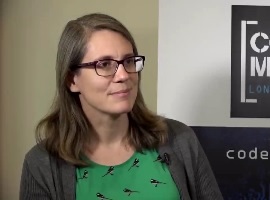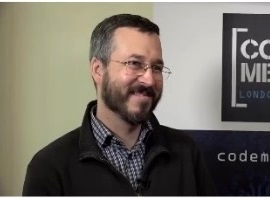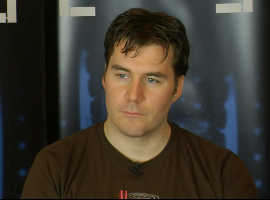InfoQ Homepage Code Mesh Content on InfoQ
-
Stephanie Weirich on Dependent Typing, Extending Haskell, Type System Research
Stephanie Weirich gives an introduction to the ideas behind dependent typing, dependent typing in Haskell, extending Haskell, and the status and future of type theory.

-
Leah Hanson on the Julia Language, Static Analysis
Leah Hanson explains the characteristics of the Julia language, its type system, how to use and implement static analysis for the Julia language in the Julia language, and much more.

-
Amir Chaudhry on Unikernels, MirageOS, HalVM, Rump Kernels
Amir Chaudhry explains the ideas behind Unikernels, implementations like the OCaml-based MirageOS and Haskell-based HalVM, Rump Kernels for integrating with legacy code and much more.

-
Andreia Gaita on .NET and Mono, Unity, VR
Andreia Gaita takes a look at the state of Core CLR and Mono, Unity, cross platform mobile apps with Mono, the state of VR and the many challenges VR developers face.

-
Darach Ennis on the Pony Language, Actors, Concurrency
Darach Ennis talks about the actor-model language Pony, its distinguishing approaches to memory management and concurrency, how it relates to Erlang, and much more.

-
Sylvan Clebsch on the Actor-Model Language Pony, Garbage Collection, Capabilities, Concurrency
Sylvan Clebsch introduces Pony, a language built on the actor model which combines new approaches to garbage collection and concepts like capabilities to write high performance, concurrent code.

-
Felienne Hermans on Applying Software Engineering Methods to Spreadsheets
Felienne Hermans explains the how and why of applying software engineering methods (testing, static analysis, refactoring) to spreadsheets.

-
William Byrd on Logic and Relational Programming, miniKanren
William Byrd explains the ideas behind logic programming languages (like Prolog) and relational programming. Also: miniKanren and core.logic, program synthesis, and much more.

-
Timothy Baldridge on Clojure's Core.Async
Timothy Baldridge explains the concepts behind Clojure's core.async, the programming model, the macro implementation, using core.async in Clojure and ClojureScript and much more.

-
Felix Klock II on Parallel JavaScript
Felix Klock II explains Parallel JavaScript (née RiverTrail): how it brings parallelism to JavaScript, what data structures and types it supports, how it relates to ECMAScript 6 specs and much more.

-
Deepak Giridharagopal on Puppet, Immutable Deployments, Analyzing Systems with PuppetDB
Deepak Giridharagopal explains the config management and automation tool Puppet, the concept of Immutable Deployments, and how Puppet DB (written in Clojure) allows to monitor and query systems managed with Puppet. Also: why PuppetDB is written in Clojure.

-
Felix Klock II on Rust: Concurrency, GCs, Type System
Felix Klock II explains concepts of the Rust language: the concurrency model, the type system, allocation and ownership models, the macro system, its style of FP and OOP, and much more.
